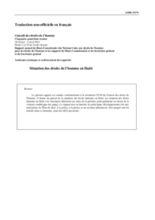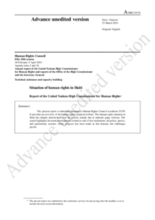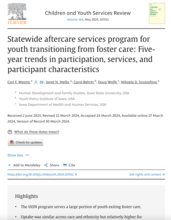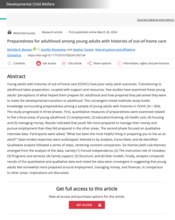Displaying 21 - 30 of 10185
Le présent rapport est soumis conformément à la résolution 52/39 du Conseil des droits de l'homme. Il donne un aperçu de la situation des droits humains en Haïti. La situation des droits humains en Haïti s'est fortement détériorée au cours de la période, principalement en raison de la violence endémique des gangs. Le rapport met en lumière les principaux développements liés aux institutions de l'État de droit, à la police, à la justice et au système pénitencier. Des progrès ont été réalisés dans ce domaine, mais des défis persistent.
This report provides an overview of the human rights situation in Haiti which has sharply deteriorated over the period, mainly due to endemic gang violence. The report highlights the main developments related to rule of law institutions, the police, justice, and penitentiary systems.
The purpose of this study was to examine trends in participation and understand the experiences of youth transitioning from foster care who were involved in the Iowa Aftercare Services Program.
This article focuses on how institutional and government authorities communicated and displayed techniques of reformative learning in New South Wales and Queensland. It examines how this learning was displayed to local communities, arguing that the work of demonstrating that the incarcerated boys in their care were learning to be good citizens was an important part of institutional governance.
This study examined 18 months of published Child Safeguarding Practice Reviews across England to identify the intersecting characteristics, vulnerabilities, harm types, indicators and issues with formal guardianship (safeguarding by carers, schools, local authorities, police and health professionals). Results revealed that children were missing, vulnerable, harmed and showed indicators of exploitation in numerous and intersecting ways.
This article addresses two issues: whether the inequalities faced by cared for children will persist in different stages of their lives and whether these inequalities are dependent on the specific out-of-home care setting, i.e. residential or foster care. The authors examine data from the German Socio-Economic Panel (SOEP), covering a 50-year period.
At the end of 2019, an innovative approach was launched in social work with young people in out-of-home care in Riga. This approach included prevention, changes in the form and methods of social work, and planning for the transition period.
On the 27th of March 2024, the UN Independent Expert on Albinism held a consultation workshop on ‘Children with Albinism and the Right to a Family Life’ in preparation for her official report to the United Nations General Assembly (UNGA).
This convergent mixed methods study builds knowledge surrounding preparedness among a sample of young adults with histories in out-of-home care in the U.S.
The purpose of this macro-level study is to examine the effects of social welfare benefits and services on the demand for child removals. The study is based on the panel data of Finnish municipalities and their social welfare indicators for the period 2010–2021.









